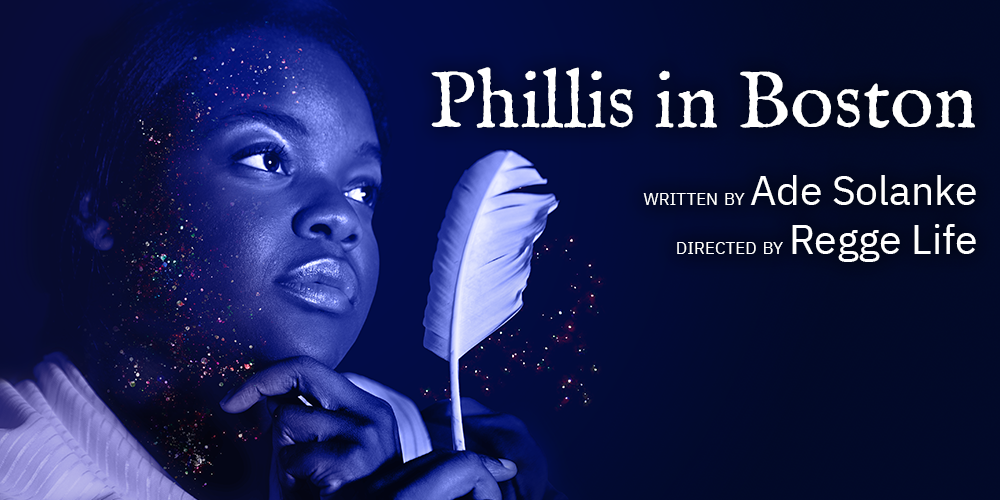Phillis In Boston, Play Celebrating African American Poet and Prodigy Phillis Wheatley’s Revolutionary Legacy, Opens Nov 3 at the Old South Meeting House

Original play written by Ade Solanke and directed by Regge Life on stage for five weeks in commemoration of the 250th anniversary of the Boston Tea Party
For Immediate Release
Contact: Sloane Wilton
Download Press Release PDF >>
BOSTON — Boston nonprofit Revolutionary Spaces announces the debut of Phillis in Boston, an original new play dramatizing a key moment in the life of both the nation and the celebrated poet Phillis Wheatley, enslaved author of the first known book of poetry in English by an African American woman, “Reflections on Various Subjects, Religious and Moral.” Published in London in 1773, it was the first known book of poetry in English by an African and the third book published by an American woman.
Phillis in Boston will be performed as a site-specific play at the Old South Meeting House in Boston, where Wheatley was a congregant. Written by award-winning British-Nigerian playwright and screenwriter Ade Solanke and directed by Regge Life, an Emmy-nominated producer, director, and writer, the play centers on a pivotal moment in the life of Wheatley, whose books arrived in Boston and were trapped on board one of the same ships carrying tea that would eventually be destroyed in the Boston Tea Party. Revolutionary Spaces commissioned the play as part of its larger arc of programming to commemorate the 250th anniversary of the Boston Tea Party, which took place on December 16, 1773.
Phillis in Boston illuminates the multiple struggles for freedom underway in Boston shortly after Wheatley returned in 1773 from a whirlwind visit to London, where she was feted as a literary celebrity. Emancipated shortly after her return, she rejoins the African American community in New England as they engage in the work of creating a free society: questioning the slave-owning colonists’ true understanding of liberty, strategizing for the abolition of slavery, and debating which side to support in the ensuing revolutionary struggle.
The play also celebrates friendship, love, community, and joy by centering Wheatley’s relationships with her friend and confidant Obour Tanner, her husband-to-be John Peters, and the dynamic abolitionist Prince Hall. Phillis in Boston explores slavery in New England through the lens of Wheatley’s complex relationship with her enslaver Susanna Wheatley, who supported Wheatley’s literary ambitions even as she kept her in bondage.
A unique work of place-based theater, Phillis in Boston will be performed at the Old South Meeting House in Boston, which was the largest indoor gathering space in colonial Boston. Built in 1729, Old South was a spiritual home to key revolutionary era figures like Wheatley, as well as the location of raucous community meetings that took place in the run-up to the Boston Tea Party.
“As we commemorate the 250th anniversary of the Boston Tea Party, which played a pivotal role in the struggle for liberty that drove the American Revolution, it is absolutely critical that we ask ‘Liberty for whom?’ This unique work offers audiences a new way to see the interplay between the struggles for freedom undertaken by enslaved people, women, and other colonists, and we’re honored to have playwright Ade Solanke, director Regge Life, and the entire creative team leading the way. We hope this play will invite audiences to consider how the work of building a democracy that started 250 years ago remains unfinished,” said Dr. Nathaniel Sheidley, President and CEO of Revolutionary Spaces.
Phillis in Boston is a companion piece to Solanke’s play Phillis in London, which explores Wheatley’s experiences as she moved through Britain’s elite literary and abolitionist circles in the summer of 1773. “I am thrilled to tell the next chapter of Wheatley’s story at Old South, because it creates an immersive glimpse into Wheatley’s Boston life as she participated in the revolution unfolding from the pews where she sat. Phillis in Boston aims to help audiences understand her not only as a literary prodigy, but also as a fervent abolitionist and entrepreneurial business woman who valued sisterhood, friendship, love, and community,” said Solanke. “This play is an entertaining memorial to a remarkable woman who overcame huge odds to create art and become the founding mother of both a nation and a vibrant, global literary tradition. I’m grateful to the entire Boston community who’ve so generously shared their ancestral ‘s/heroes’ with me.”
There will be two preview performances on Wednesday, November 1 and Thursday, November 2. Opening night will be Friday, November 3. Performances will run through Sunday, December 3. Sunday night performances will begin at 6pm (doors open at 5:30pm). All other performances will begin at 7pm (doors open at 6:30pm). More information can be found here.
Phillis In Boston is made possible through the generous support of the Cabot Family Charitable Trust, the New England Women’s Club Fund, and Boston Tea Party 250th Anniversary Commemoration Transformational Partner Meet Boston. Revolutionary Spaces also thanks its travel partners JetBlue.
ABOUT PLAYWRIGHT ADE SOLANKE
Adeola Solanke is an award-winning playwright and screenwriter and founder of Spora Stories. Her plays include her acclaimed debut Pandora’s Box, which won a Best New Play nomination in London’s Off-West End Theatre Awards and was shortlisted for the $100,000 Nigeria Prize for Literature, Africa’s biggest literary award. Her play The Court Must Have a Queen, commissioned by Historic Royal Palaces, was staged at Hampton Court Palace. Her work has also been performed at the Arcola, Almeida, Young Vic, and Sheffield Crucible theaters.
A double Fulbrighter, she was a 22/23 Fulbright Distinguished International Scholar at Emerson College and was formerly a Fulbright Fellow, Phi Beta Kappa International Scholar, and Association of American University Scholar at USC, where she earned an MFA from the School of Cinematic Arts. In Los Angeles, she was twice an Academy Nicholls Screenwriting Fellowship semi-finalist. A story analyst for New Line and Sundance, she also worked in the story department at Disney. Solanke has a BA Hons in English Literature from the University of Sheffield, winning its Distinguished Alumni Award in 2016. She has written for the BBC, The Guardian, The Times Literary Supplement, Art Monthly, The Voice, West Africa Magazine, and others. A Hawthornden Fellow, she was also a founding Fellow of the Royal Literary Fund and has run playwriting programs at the Royal Court, Soho and Arcola theaters in London. She has also taught dramatic writing at universities in London and in Nigeria, Ghana, and Zimbabwe.
ABOUT DIRECTOR REGGE LIFE
Regge Life is a producer, director, and writer. His latest show is Cross That River at 59E59 Theaters in New York City. For Shakespeare and Company in Lenox, MA, he directed the 2022 production of Hymn, the 2019 multiple Berkie Award-winning production of Topdog/Underdog, the widely acclaimed Morning After Grace in 2018, God of Carnage in 2017, and Kaufman’s Barbershop in 2013. He has directed across the country with credits I Just Stopped by to See the Man for Milwaukee Rep, Yellowman and Gem of the Ocean for Pittsburgh Public Theater, Ghosts for the Pearl Theater, The Piano Lesson for Virginia Stage Company, A Walk in the Woods at Capital Rep, Rebel Armies Deep Into Chad, and Laurence Fishburne’s Riff Raff and Arthur Miller’s The American Clock for the Juilliard School. He is currently the Senior Distinguished Director in Residence at Emerson College in Boston.
ABOUT REVOLUTIONARY SPACES
Revolutionary Spaces stewards the historic Old South Meeting House and Old State House as landmarks, museums, and gathering spaces for the open exchange of ideas and the continuing practice of democracy. Viewing history as a powerful tool for today, Revolutionary Spaces brings people together to explore the American struggle to create and sustain a free society.
ABOUT THE OLD STATE HOUSE
The 1713 Old State House served as the seat of government for the province of Massachusetts during the Revolutionary era. Today, it is a museum and historic site offering tours, exhibits, and public programs exploring Boston’s Revolutionary-era history.
ABOUT OLD SOUTH MEETING HOUSE
The 1729 Old South Meeting House was a Congregational church and the largest gathering place for popular politics in Revolutionary Boston. Today it is a busy museum, treasured landmark, and active center for civic dialogue and free expression.
ABOUT PHILLIS WHEATLEY
Phillis Wheatley was a literary prodigy and enslaved girl in 18th century Boston who became the first African American woman to publish a book of poetry in English. A devout Christian, Wheatley was admitted to Old South Meeting House’s congregation when she was about 18 years old. Born in Gambia in around 1753, Wheatley was captured by slave traders and sold to the Wheatley family in Boston. Educated by the Wheatley family, she began to write poetry at around age 14. In 1773, she traveled to London to publish her first collection of poems—the first book in English published by an African American woman in America. She was emancipated shortly after. A supporter of the Patriots during the American Revolution, Wheatley also became a vocal opponent of slavery until her death in 1784.
ABOUT THE BOSTON TEA PARTY
In 1773, the Old South Meeting House hosted a number of meetings about what to do with the East India Tea Company tea sitting in Boston Harbor waiting to be unloaded and taxed. On December 16, 1773, the final meeting at Old South would serve as the start of the Boston Tea Party. Over 5,000 men debated the controversial tea tax – resulting in Samuel Adams giving the signal that would start the Boston Tea Party. Frustrated and angry, colonists marched to Griffin’s Wharf and dumped 342 chests of tea into the Boston Harbor – a major act of defiance to British rule over the colonists and a spark for the American Revolution.
###

